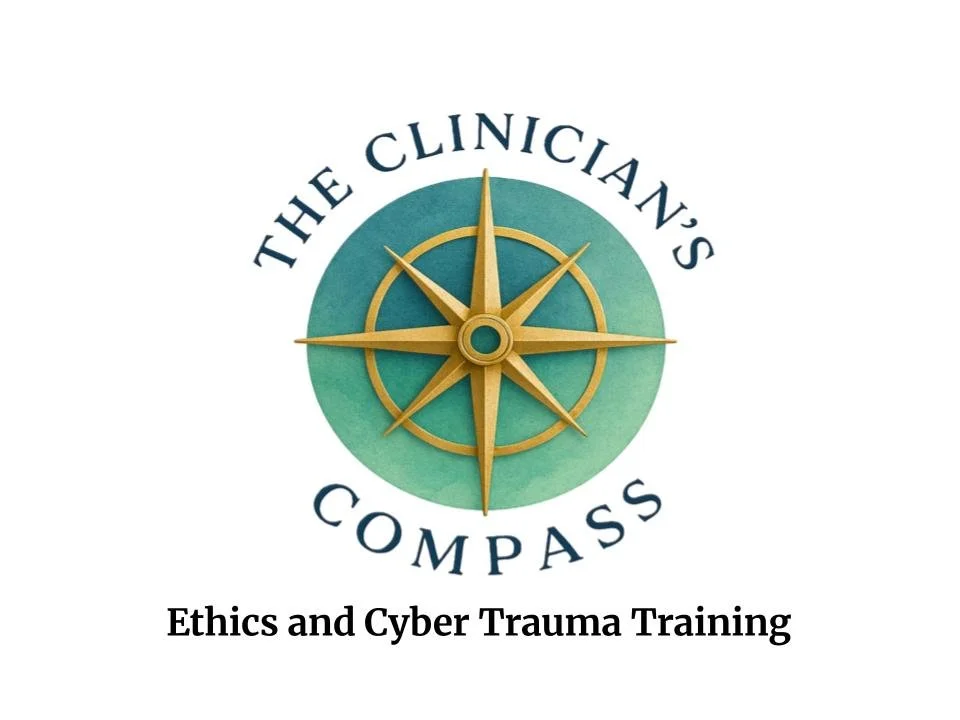 Image 1 of 1
Image 1 of 1


The Clinicians Compass: Ethics and Cyber Trauma Training
Join us for this live 6 Hour NBCC approved CE event where Stacy Phillips, LPC-MHSP, S and Stacy Jagger , DMin, LMFT, RPT-S take clinicians through a full day of experiential learning in the areas of Ethical Models and Cyber Trauma Treatment.
Session 1- Ethical Decision Making in Mental Health Treatment: Models, Mandates and Confidence Building
Instructor- Stacy Phillips, LPC-MHSP, S, C-DBT
Learning Objectives:
By the end of this session, participants will be able to:
Understand the hierarchy of ethical decision-making in mental health practice
Recognize legal mandates versus ethical mandates and prioritize them appropriately.
Apply clinically researched ethical decision-making models in practical scenarios.
Develop confidence in addressing ethical dilemmas in therapeutic practice.
Reduce anxiety and imposter syndrome related to ethical decision-making.
Practice ethical decision-making through role-plays simulating real-life scenarios.
Session 2: Treating Cyber Trauma; An Integrated and Systemic Approach
Instructor- Stacy Jagger, DMin, LMFT, RPT-S
By the end of this session, participants will be able to:
Describe the theoretical framework and clinical application for treating cyber trauma.
Identify the phases of the treatment and the clinician’s role in supporting client progress.
Demonstrate at least three integrative and systemic techniques designed to enhance client regulation and self-awareness.
Evaluate clinical scenarios to determine when and how the integrative and family systemic approach can be integrated into greater family systems treatment.
Apply the clinical process ethically and effectively within their current scope of practice.
Where: The Hampton Inn- 7101 Berry Farms Crossing, Franklin, TN 37064
When : Friday, January 23rd, 2026
Time: 9-4:30pm
CE’s- 6 NBCC approved hours (3 ethics)
Lunch/Snacks Included
Financial Investment: $300
$50 off until January 16th- Use Coupon Code FIRST50
Please read our Course Agreement Form.
Registering for this course signifies you have read and agree to the terms.
Join us for this live 6 Hour NBCC approved CE event where Stacy Phillips, LPC-MHSP, S and Stacy Jagger , DMin, LMFT, RPT-S take clinicians through a full day of experiential learning in the areas of Ethical Models and Cyber Trauma Treatment.
Session 1- Ethical Decision Making in Mental Health Treatment: Models, Mandates and Confidence Building
Instructor- Stacy Phillips, LPC-MHSP, S, C-DBT
Learning Objectives:
By the end of this session, participants will be able to:
Understand the hierarchy of ethical decision-making in mental health practice
Recognize legal mandates versus ethical mandates and prioritize them appropriately.
Apply clinically researched ethical decision-making models in practical scenarios.
Develop confidence in addressing ethical dilemmas in therapeutic practice.
Reduce anxiety and imposter syndrome related to ethical decision-making.
Practice ethical decision-making through role-plays simulating real-life scenarios.
Session 2: Treating Cyber Trauma; An Integrated and Systemic Approach
Instructor- Stacy Jagger, DMin, LMFT, RPT-S
By the end of this session, participants will be able to:
Describe the theoretical framework and clinical application for treating cyber trauma.
Identify the phases of the treatment and the clinician’s role in supporting client progress.
Demonstrate at least three integrative and systemic techniques designed to enhance client regulation and self-awareness.
Evaluate clinical scenarios to determine when and how the integrative and family systemic approach can be integrated into greater family systems treatment.
Apply the clinical process ethically and effectively within their current scope of practice.
Where: The Hampton Inn- 7101 Berry Farms Crossing, Franklin, TN 37064
When : Friday, January 23rd, 2026
Time: 9-4:30pm
CE’s- 6 NBCC approved hours (3 ethics)
Lunch/Snacks Included
Financial Investment: $300
$50 off until January 16th- Use Coupon Code FIRST50
Please read our Course Agreement Form.
Registering for this course signifies you have read and agree to the terms.